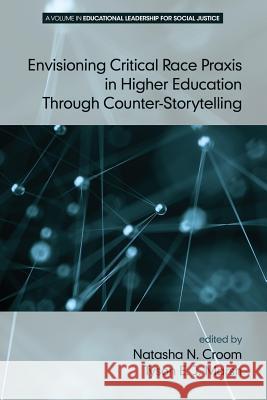Envisioning Critical Race Praxis in Higher Education Through Counter-Storytelling » książka
Envisioning Critical Race Praxis in Higher Education Through Counter-Storytelling
ISBN-13: 9781681234052 / Angielski / Miękka / 2016 / 190 str.
Envisioning Critical Race Praxis in Higher Education Through Counter-Storytelling
ISBN-13: 9781681234052 / Angielski / Miękka / 2016 / 190 str.
(netto: 196,40 VAT: 5%)
Najniższa cena z 30 dni: 203,70
ok. 30 dni roboczych.
Darmowa dostawa!
A volume in Educational Leadership for Social Justice Series Editors: Jeffrey S. Brooks, Monash University, Denise E. Armstrong, Brock University; Ira Bogotch, Florida Atlantic University; Sandra Harris, Lamar University; Whitney H. Sherman, Virginia Commonwealth University; George Theoharis, Syracuse University While critical race theory is a framework employed by activists and scholars within and outside the confines of education, there are limited resources for leadership practitioners that provide insight into critical race theory and the possibilities of implementing a critical race praxis approach to leadership. With a continued top down approach to educational policy and practice, it is imperative that higher education leaders understand how critical race theory and praxis can assist them in utilizing their agency and roles as leaders to identify and challenge institutional and systemic racism and other forms/manifestations of oppression (Stovall, 2004). In the tradition of critical race theory, we are charged with the task of operationalizing theory into practice in the struggle for, and commitment to, social justice. Though higher education leaders and leadership programs are often absent in this process, given their influence and power, higher education leaders need to be engaged in this endeavor. The objective of this edited volume is to draw upon critical race counter stories and praxis for the purpose of providing higher education leaders in training and practicing higher education leaders with tangible narratives that demonstrate how racism and its intersectionality with other forms of oppression manifest within higher education. An additional aim of this book is to provide leaders with a working knowledge of the central tenets of critical race theory and the tools that are required in recognizing how they might be complicit in the reproduction of institutional and systemic racism and other forms of oppression. More precisely, this edited volume intends to draw upon and center the lived experiences and voices of contributors that have experienced racism in higher education. Through the use of critical race methodology and counter storytelling (Solorzano & Yosso, 2002), contributors will share and interrogate their experiences while offering current and future higher education leaders insight in recognizing how racism functions within their respective institutions, and how they can address it. The intended goal of this edited volume is to translate critical race theory into practice while emphasizing the need for higher education leaders to develop a critical race praxis and anti racist approach to leadership."
A volume in Educational Leadership for Social JusticeSeries Editors: Jeffrey S. Brooks, Monash University,Denise E. Armstrong, Brock University; Ira Bogotch, Florida Atlantic University;Sandra Harris, Lamar University; Whitney H. Sherman, Virginia Commonwealth University;George Theoharis, Syracuse UniversityWhile critical race theory is a framework employed by activists and scholars within and outside the confines of education, there are limitedresources for leadership practitioners that provide insight into critical race theory and the possibilities of implementing a critical racepraxis approach to leadership. With a continued top-down approach to educational policy and practice, it is imperative that highereducation leaders understand how critical race theory and praxis can assist them in utilizing their agency and roles as leaders to identifyand challenge institutional and systemic racism and other forms/manifestations of oppression (Stovall, 2004). In the tradition of criticalrace theory, we are charged with the task of operationalizing theory into practice in the struggle for, and commitment to, social justice.Though higher education leaders and leadership programs are often absent in this process, given their influence and power, highereducation leaders need to be engaged in this endeavor.The objective of this edited volume is to draw upon critical race counter-stories and praxis for the purpose of providing higher educationleaders-in-training and practicing higher education leaders with tangible narratives thatdemonstrate how racism and its intersectionality with other forms of oppression manifest withinhigher education. An additional aim of this book is to provide leaders with a working knowledgeof the central tenets of critical race theory and the tools that are required in recognizing how theymight be complicit in the reproduction of institutional and systemic racism and other forms ofoppression. More precisely, this edited volume intends to draw upon and center the livedexperiences and voices of contributors that have experienced racism in higher education. Throughthe use of critical race methodology and counter-storytelling (Solórzano & Yosso, 2002),contributors will share and interrogate their experiences while offering current and future highereducation leaders insight in recognizing how racism functions within their respective institutions,and how they can address it. The intended goal of this edited volume is to translate critical racetheory into practice while emphasizing the need for higher education leaders to develop a criticalrace praxis and anti-racist approach to leadership.











